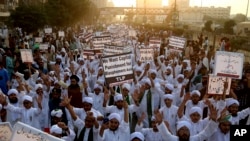Pakistan’s top human rights body has expressed alarm at what it considers recurring attacks on academic freedom of expression through use of the country’s controversial blasphemy or sedition laws that could carry a death sentence.
“Indeed, it has become frighteningly common to hear of charges of sedition and blasphemy being used to intimidate citizens who dare speak up,” said a press release issued Wednesday by the Human Rights Commission of Pakistan, titled, “Academic Freedom Under Grave Threat.”
The statement followed the arrest of a professor, Sajid Soomro, from Shah Abdul Latif University in Sindh province on charges of blasphemy and sedition.
When another professor, Arfana Mallah, who is also a human rights activist, raised her voice in solidarity, she was, as per the HRCP statement, “immediately subjected to a vicious campaign led by clerics with political associations, calling for her to be charged with blasphemy.”
According to Mallah, she never mentioned any religion or religious figure. She did, however, criticize Pakistan’s blasphemy measure, calling it a “black law.”
“This law has been widely misused, and people are hit with blasphemy charges to deal with personal disputes,” she said.
Death threat
Mallah added followers of a religio-political party, Jamiat e Ulema e Islam Fazal (JUI-F), took aim at her on social media and local representatives of the party tried to file a police report against her.
While the police refused to accept a complaint, Mallah said the social media campaign continued.
“They’ve started a campaign on social media that this woman committed blasphemy and she should be killed and that we would not rest until she is arrested,” she told VOA.
A senior JUI-F official from Sindh, Rashid Soomro, denied that his party workers called for her death, adding that if anyone did, “I strongly condemn it.”
“No one is allowed to call for another’s death,” he said, adding that it was a job best left to the state and courts.
'Sensitive issue'
He also said that blasphemy was a sensitive issue in Pakistan and by going to the police and using the legal option, his party was trying to keep the emotions of hundreds of thousands of people under control.
“Party workers did not go to her house, block roads, or protest. Rather, they took the legal route, which is our constitutional right. Whatever the court decides, the party will accept,” he said.
An accusation of blasphemy in Pakistan is considered tantamount to a death sentence. People in the past have been killed by mobs, shot by their own guards, or sentenced to death by the courts. Prime Minister Imran Khan has voiced his support for the blasphemy law.
Rights activists have long demanded either an abolition of the laws or major amendments to them, citing their widespread misuse.
In 2018, Pakistan’s Supreme Court overturned a blasphemy conviction against a Christian woman, Asia Bibi, after she had already spent at least eight years in prison. Court documents showed Bibi had an argument with other women over drinking water.
An Islamist party, Tehreek e Labbaik Pakistan, protested the acquittal, its leaders threatening the Supreme Court justices with death.
In a 2017 incident, student Mashal Khan was killed by a mob inside his university after an accusation of blasphemy. It later emerged that the accusation stemmed from differences with the university administration and his persistent criticism of their policies.
A powerful political figure in Pakistan, Salman Taseer, was killed by his own security guard in 2011 when he labeled the blasphemy measure a “black law” and called for its reformation.
Haris Khaleeq, the secretary general of HRCP, said while multiple religio-political parties use blasphemy or sedition accusations against people, their intention does not seem to be to safeguard the fundamental principles of faith.
“It is purely a political game...to use the sentiments of the general public to make gains in the political arena,” he said.
Mallah said the campaigns were resulting in shrinking freedom of expression in society.
“I truly believe that all progressive, liberal, and democratic voices who believe in constitutional freedoms are being silenced,” she said.





